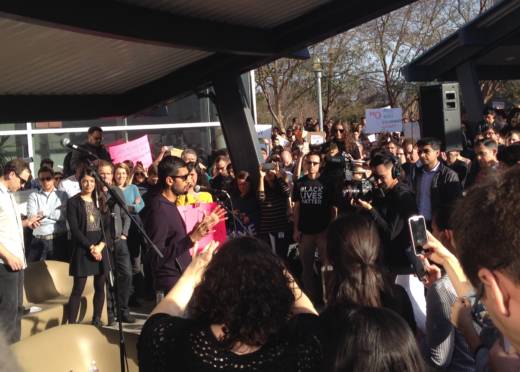“You know, the typical immigrant story,” he said.
It’s also a typical Silicon Valley story. From the Hungarian-born Andy Grove, who went on to be a founder of Intel, to Soviet-born Sergey Brin at Google and Dara Khosrowshahi, the Iranian-born American citizen who is the CEO of Expedia, immigrants have been integral to the tech industry.
“The special sauce in Silicon Valley has always been this amalgamation of people from different backgrounds and different skill sets,” Xu said. “It’s best that we can congregate as much of that in Silicon Valley to solve the next set of problems. If we stop the flood of talent, that’s not going to happen.”
Trump’s executive order isn’t really stopping that flood of talent. The number of tech workers from the seven countries named in the immigration ban represent a very small portion of the tech workforce. In a leaked email, Google CEO Sundar Pichai said a minimum of 187 Google employees were affected. Google employs about 60,000 people around the world.
Given the relatively small numbers affected by the executive order, the protests and general outrage on Twitter among tech workers seems disproportionate. So what gives?
While exact numbers are difficult to come by, Joint Venture Silicon Valley estimates that roughly 30 percent of tech workers are foreign-born noncitizens, in the U.S. on green cards and various visas. And the executive order, coupled with Trump’s divisive rhetoric against immigrants during the campaign, are being interpreted by this workforce as an attack on immigration writ large.
“You have this era of uncertainty where people are unsure and all they can think about, appropriately, is their immigration process,” said Romish Badani, co-founder and CEO of Bridge US, a San Francisco-based company that helps other firms with the immigration process.
“There’s very little productive work that probably got done last week for a foreign national, whether you’re an entrepreneur or you’re an employee of a company,” Badani said.
That decline in productivity was on view at Google’s Mountain View campus last week. Hundreds of employees stopped work to hold a protest against the executive order.
At the protest, it was clear that the messy rollout of the executive order created panic. Tech workers with green cards weren’t sure if they could enter the country. At one point it appeared the Trump administration reserved the right to revoke visas that were already granted.
Soufi Esmaeilzadeh, a product manager at Google, got caught up in this chaos. She’s a Canadian citizen who was born in Iran and is in the U.S. on a green card. The Friday the executive order was issued, Esmaeilzadeh was in Switzerland on a business trip. She called Google to ask if she should come home.
Esmaeilzadeh read from the company's emailed response to her, as she stood before the gathering of protesters.
“I highly recommend that you do not return to the states right now,” she read. "And that we figure out a short-, medium- and long-term plan about where we can place you.”
Esmaeilzadeh asked the company what would happen if she tried to return to the U.S.
Google answered that “the likelihood was very high that I would either be deported or turned away or put on the next flight to Canada or back to Europe,” Esmaeilzadeh said. “Either of those situations could be put into my record and cause problems for me in the future.”
After a judge in Seattle put a hold on the ban, Esmaeilzadeh said Google told her to rush back home. But the scenario raises many questions. If you’re Google, do you stop sending some noncitizens on business trips for fear another order might come down? How do you recruit and plan in the face of such uncertainty?
Michael Tippett’s answer: move to Canada. Tippett is with True North, a company that is helping American tech companies with foreign workers set up subsidiaries in Vancouver. He says Canada has friendlier immigration policies when it comes to tech workers.
“I think the eventual outcome of this could be that you get an exodus of incredibly talented world-class experts who have been brought to Silicon Valley,” Tippett said. But they may “find themselves wanting to find a second home and Vancouver might be that place.”
So does this mean Vancouver is the new Silicon Valley?
Not by a long shot, say venture capitalists. While Silicon Valley is feeling uncertain about what lies ahead, the fact remains that the venture money and big companies are established in the San Francisco Bay Area. And a few defections aren't going to change that.
60dB is a personalized radio app where you can hear Liz Gannes' work and more.
This story is part of our ongoing series on Techquity: Diversity, Inclusion and Equity in Silicon Valley.

